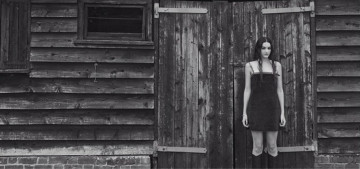

Search
Hit enter to search or ESC to close

Etta Marcus
-
Mon 20th Oct 2025 | Upstairs Whelans, Dublin | Tickets Available | Doors 8:00 PM
Book Now

Tickets €33.65 Available From: whelanslive.com // (Wav) 1890 200 078 • Ticketmaster.ie. *Inc Booking Fee. Bookings Subject To 12.5% Service Charge Per Ticket (Max €10.50)
“Bitterness is like cancer. It eats upon the host. But anger is like fire. It burns it all clean.” - Maya Angelou
When Etta Marcus began writing the forthright, ferocious ‘Girls Are God’s Machines’ - the lead single from her perspective-shifting new EP ‘Devour’ - the 24-year-old South Londoner had no idea that so much rage was pent up inside of her. Until that point, Etta had been slowly expanding her palette of richly-evocative storytelling, dipping into indie and rock, folk and pop to weave visceral tales of the brain and the body. 2024’s acclaimed mini album ‘The Death of Summer & Other Promises’ had explored almost gothic lyrical terrain, from a prostrating kind of love on breakthrough single ‘Theatre’ to ‘Fruit Flies’’ tactile meditation on aging. But ‘Girls Are God’s Machines’ and ‘Devour’ were something quite different…
“It really surprised me when I wrote it. I wouldn’t say I’m normally an angry person but it turns out, in the last year, I was,” she laughs wryly. “There were a lot of experiences I’d had as a woman of feeling like I wasn’t being listened to: experiences that I hadn’t really addressed previously in terms of misogyny or sexism that I’d faced. This is the female experience and I don’t want to settle for it.”
Simultaneously alongside weathering these internal storms, however, Etta was also falling deeper in love. Terrifying and vulnerable in an entirely opposite way, the comparison was not lost on the songwriter. “There’s a dual aspect to the EP: being able to devour something in a really lovely, satisfying way but also being devoured in a really horrific way,” she says. “I like the idea of being able to sing about love with a violent aspect to it because love is violence where you’re almost sacrificing yourself. I was seeing myself as this Pearl-like character with an axe, either hunting down others or being devoured myself.”
Having started her musical journey bound by the rigidity and rules of the prestigious jazz conservatoire that she then departed partway through her studies, Etta has been forcibly unlearning those restrictive parameters ever since. Her own origin story might not be the villain arc of Mia Goth’s cinematic star, but it involves a defiance and a fight of its own that’s been increasingly well-received, garnering her early support from BBC Radio 1, NME, DIY Magazine and more.
Writing ‘Devour’ over several trips to the seaside town of Whitstable during its lonely winter off-season, she prioritised not only a more self-sufficient approach, but also a desire to bring in heavier, punk influences born of the rawness and rough edges that these gnarlier topics required. Having grown up listening to Nirvana and Radiohead, with more recent artists like Fontaines DC and PJ Harvey also on heavy rotation, Etta started allowing herself to embrace a more “dangerous” side to her tastes.
On ‘Girls Are God’s Machines’, her vocals grow in intensity as the song progresses, the breaks and cracks coming through past a cathartic mid-section. “I was brought up with classical training and perfection, but it was really fun to disassociate from that,” she says. ‘Pointing At The Moon’, meanwhile, finds her flexing her production muscles, chopping up drums and making beats that come on like Lana Del Rey turning trip-hop (Etta supported the global superstar at her BST Hyde Park show in 2023, in fact). Influenced by Portishead, Björk and Fontaines, it’s completely new and wildly exciting terrain.
The spacious anthemics of opener ‘Teenage Messiah’, she explains, came from an anger of the political kind; of “looking out at a world where everything feels like it’s being left to the younger generation to clean up, and feeling that sense of vengeance”. “I had a lot of imagery in my mind of these kids getting in a pick-up truck with their weapons of choice - be that a lollypop or whatever it may be - and coming together to sort out the mess,” she continues.
Conversely, the noirish guitars and sardonic eyerolls of ‘Lucky Lady’ turn the toxicity inwards as she plays a “secret female murderer” whose problems come wholly from inside the house. One of a few songs that Etta riffed ideas off alongside musician Benjamin Francis Leftwich (“I’m a very analytical writer whereas he’ll just vomit everything out so I really took on that as a new way of working”), it was recorded during an impromptu trip to France’s storied La Frette - the gorgeous residential studios that have previously hosted the likes of Nick Cave and Arctic Monkeys. It all then closes with ‘Slaughterhouse’: a track that seeks understanding in spite of fear, throwing itself into the maelstrom and accepting the mess.
Harnessing anger as an energy whilst also making space for love, ‘Devour’ feels like a coming-of-age moment in its truest sense. It’s not about wide-eyed romance but something far more gritty and hard-earned, that still manages to keep room for play and fantasy intact. Heading into a debut album proper, it sets Etta Marcus up as a truly exciting voice; one able to plumb the depths of the human condition and emerge with its bloody heart still beating. Just like Pearl would want.
Recommended Artists





